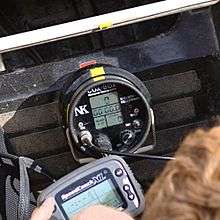Cox box
A cox box is an electronic device used in competitive rowing that combines a digital stroke rate monitor and elapsed time readout with a voice amplifier. Although the term "cox box" is often used as a generic descriptor of this type of device, "Cox-Box", "CoxBox" and "Cox Box" are registered trademarks of Nielsen Kellerman, one of the several companies that manufacture this type of unit. Other brand names include CoxVox, CoxOrb, MiniAmp, CoxAmpPro, Coxmate SRT+, Coxmate SX which has a 10Hz GPS module to track boat speed. All deliver amplification of the coxswain's voice using a microphone and series of wired loudspeakers.

Use
Cox boxes are mainly used in eights and fours, where the readouts are used by the coxswain to monitor the performance of the crew and manage the race. This is of particular importance in Head of the River (time trial) races where the crews race line astern and so performance of other crews cannot be easily gauged. It is also critical to assisting the coxswain in sticking to the race plan, which usually involves strategic changes of rating.
The amplifier is linked to one or more loudspeakers along the boat making it easier for the crew to hear commands, this is particularly important for the rower in the bow seat as they are often furthest away. The coxswain typically wears a headband-mounted microphone, which is attached by a wire and quick release to the amplifier. Some units allow a walkie-talkie connection to the coach so they can use the amplification to speak directly to the crew as well.
Rowing shells fitted with speed measuring impellers or GPS can report boat speed to the amplifier display, typically measured in Meters/second or 500 meters predicted split time. GPS speed measurement is presently only on Coxmate SCT and SX units.
History
Before the development of the Cox Box by Nielsen-Kellerman, a megaphone strapped to the head of the coxswain was used to make the coxswain easier to hear, and the coxswain used an analog stop watch and rate watch - quite a handful when also trying to steer a 60' long racing shell! The use of a system with multiple speakers also became much more important when racing eight construction switched to sealed bulkhead sections to ensure the boat would remain safely buoyant even when damaged. This is because sound could no longer travel down the hull as was possible with the previous open style of construction.
Strokes per minute (SPM) or rating
Almost all modern coxswain's amplifier systems have a liquid crystal display, showing the strokes per minute (SPM). On most systems, a magnet is positioned under the stroke man's seat. In bowloaded boats, the magnet is placed under the bow man's seat. As the rower moves up the slide (moving forward to prepare for the next stroke), a measurement is taken, and fed to the system. The stroke seat (first rower in the stern) sets the rate of rowing for the whole crew so this is very important. The display also usually features a timer which can be stopped, cleared, and reset, along with a stroke counter. For rows in poor lighting, the display is also equipped with a backlight.
References
- http://www.nkhome.com/rowing-sports/who-uses-our-products/nk-sports-performance-rowing/
- next-pro.co.il